Senate Races 2008
While the 2008 election is a long way off, one fact stands out right now: the Democrats will be defending 12 seats and the Republicans will be defending 22 seats. No matter what else happens, the Democrats have a lot more targets to shoot at. While a few incumbents may call it quits, by and large being a senator is a cushy job, so few people retire until they hit about 90, or die, whichever comes first. Thus half the cast of characters is known already--the incumbents.
Click on a picture for the candidate's home page.
Click on a name for the candidate's entry in the Wikipedia.
Click on a party (D) or (R) for the state party
All off-site references open in a new window. Type CTRL-W in the window to close it.
Seats held by Democrats
Arkansas
| Incumbent | Challenger | Notes |

Mark Pryor (D) |

(R) |
Mark Pryor got only 54% of the vote in 2002, but Arkansas is surprisingly Democratic for a Southern state. Both senators are Democrats, Mike Beebe (D) was just elected governor by 15% and three of the four congressional seats were just won by Democrats. Pryor has a net +24% (approval - disapproval) popularity rating, so unless the GOP finds an exceptionally strong challenger, Pryor is probably safe. Pryor trivia: His father, David Pryor, was an Arkansas senator from 1979 to 1995. |
Delaware
| Incumbent | Challenger | Notes |
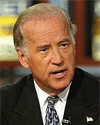
Joe Biden (D) |

(R) |
Joe Biden wants to be president. Trouble is, nobody else quite sees it that way, certainly not the junior senators from New York and Illinois. He's been running for the job on and off since 1988, when his campaign was sidetracked after it became known that he plagiarized a speech from a British politician, Neil Kinnock. He is trying to grab the brass ring again, but after his campaign fizzles, he'll settle for a seventh term in the Senate, where he has served since he was 30. |
Illinois
| Incumbent | Challenger | Notes |

Dick Durbin (D) |

(R) |
Dick Durbin is assistant majority leader and obviously wields great power in the Senate. He won in 2002 by 22% and is moderately popular in Illinois (net approval: +13%) although he has made some gaffes. Still, it will be tough to convince the Illinois voters to dump the second most powerful person in the Senate for a minority backbencher who will have no power at all. All in all, Durbin is the solid favorite. |
Iowa
| Incumbent | Challenger | Notes |

Tom Harkin (D) |

(R) |
Tom Harkin is chairman of the Senate agriculture committee, something of great interest to Iowa's many small farmers. He is somewhat more liberal that the state as a whole. Still, replacing a guy with a lot of power in an area Iowans care about with a newbie with no power seems unlikely. He'll probably be reelected unless the Republicans can find a candidate who can make pigs fly. |
Louisiana
| Incumbent | Challenger | Notes |

Mary Landrieu (D) |

John Kennedy (R) |
Mary Landrieu is one of the two Democrats who barely squeaked by in 2002, having won in a runoff with 52%. The Republicans have her in their crosshairs. They might try to blame hurricane Katrina on her (or more specifically, her response to it), but that would be playing with fire as she would would likely then blame the Republican administration. Her net approval rating is +10%--not great--so this is one of the Republicans best chances for a pickup. Her worst problem is that hundreds of thousands of people, most of them Democrats, left the state after the hurricane. Her likely opponent is state treasurer John Kennedy, who recently switched from the Democratic party to the Republican party to run against Landrieu. Landrieu trivia: Her father, Moon Landrieu, was mayor of New Orleans from 1970 to 1978, and her brother is the current Lt. Governor of Louisiana. |
Massachusetts
| Incumbent | Challenger | Notes |

John Kerry (D) |

(R) |
John Kerry was going to run for President again, but he quickly learned that he was the only one who thought that was a good idea and gave up in January. Given how Democratic Massachusetts is, it is hard to imagine the Republicans being able to unseat him however. He's safe. |
Michigan
| Incumbent | Challenger | Notes |

Carl Levin (D) |

(R) |
Carl Levin is chairman of the Senate Armed Services committee. That's the committee that deals with wars and stuff like that. Expect to see a lot of Carl on TV this year. How is a Repblican opponent going to top a Senate committee chairman denouncing the increasingly-unpopular war in Iraq? By supporting the war? That won't work in Michigan. Levin is safe. |
Montana
| Incumbent | Challenger | Notes |
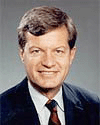
Max Baucus (D) |

(R) |
A lot of liberal Democrats dislike Max Baucus because he is quite conservative and often works with the Republicans. He is chairman of the powerful finance committee, which writes the tax laws. He has approved of most of the Bush tax cuts, which clearly antagonizes part of the party. On the other hand, in part due to his positions, he had a 32% margin over his Republican opponent in 2002 (vs. 1% for Jon Tester in Nov. 2006), so it will be nearly impossible for the Republicans to unseat him. So far no top-tier Republican has expressed any interest in what is likely to be a futile endeavor. |
New Jersey
| Incumbent | Challenger | Notes |

Frank Lautenberg (D) |

(R) |
If Frank Lautenberg runs again and wins, he will be be three weeks short of his 91st birthday when his term ends. Even by Senate standards, this is getting on in years. He was first elected to the Senate in 1982, then he was reelected in 1988. In 1994, the year of the Republican revolution, he got reelected a third time. When that term ended in January 2001, he retired from politics. However, in 2002, incumbent Bob Torricelli got caught with his hand in the cookie jar and it looked like the Democrats might lose a safe seat. The party elders implored Lautenberg to go for another hurrah, so Torricelli departed, Lautenberg entered, and the Democrats held New Jersey. There is a good chance that he might really retire this time. If he announces it early enough for another candidate to be found, the Democrats can probably hold this seat. After all, Tom Kean, Jr., son of a popular governor, took a real beating at the hand of Bob Menendez in 2006, despite all the corruption charges swirling around Menendez. |
Rhode Island
| Incumbent | Challenger | Notes |

Jack Reed (D) |

(R) |
Jack Reed is a quiet kind of guy who is rarely in the news. But he is immensely popular in highly Democratic Rhode Island, having won his fourth term in 2002 78% to 22%. With his military background (he graduated from West Point and served in the fabled 82nd Airborne Division) he is unassailable on national security matters. With Reed's net +38% approval rating, the Republicans will be lucky if they can find a sacrificial lamb to run against him. This is likely to be the most lopsided Senate race in 2008. |
South Dakota
| Incumbent | Challenger | Notes |

Tim Johnson (D) |

(R) |
Tim Johnson is one of the two most endangered Democratic senators. He got just 50% of the vote in 2002 against John Thune, who ran again in 2004 and beat Tom Daschle. Furthermore, South Dakota is a heavily Republican state. Despite his narrow win in 2002, Johnson has a +46% net approval rating, so the people of South Dakota like the way he is doing his job. Unfortunately, Johnson suffered a cerebral hemorrhage Dec. 13, 2006. He was operated on immediately and is now recovering. All signs show that he intends to run for reelection in 2008. While he is in no condition to campaign now, a group of his (Democratic) friends in the Senate have begun holding fundraisers for him, so when he is ready to hit the campaign trail, he will have plenty of money. All this puts potential Republican candidates in a bind. Actively campaigning against a very popular senator who had a stroke makes them look mean. If Gov. Mike Rounds runs, it will be a real horse race; if Rounds declines, Johnson will be reelected as the GOP bench is thin here. |
West Virgina
| Incumbent | Challenger | Notes |

Jay Rockefeller (D) |

(R) |
How the grandson of John D. Rockefeller ended up in dirt-poor West Virginia is a bit of an oddity. After studying Far Eastern languages at Harvard and then spending three years in Japan, he joined the Peace Corps, where he met Bobby Kennedy. Then he joined VISTA and moved to West Virginia. Eventually he decided he could do more for West Virginians top down than bottom up, so he ran for the House of Delegates and won. Later he was elected Secretary of State, Governor, and finally in 1984 to the U.S. Senate. He won his fourth term in 2002 by 26% and will probably win his fifth term in 2008 by a similar margin. Rockefeller trivia: His uncle, Nelson Rockefeller, was Vice President, and his father in law, Charles Percy, was senator (R-IL). |
Seats held by Republicans
Alabama
| Incumbent | Challenger | Notes |

Jeff Sessions (R) |

(D) |
Alabama is a very Republican state and Jeff Sessions is reasonably popular, with a net approval rating of +19%. It is unlikely the Democrats can muster a strong opponent, so Sessions will coast easily to a third term. Sessions trivia: His full name is Jefferson Beauregard Sessions III, clearly a man from the South. |
Alaska
| Incumbent | Challenger | Notes |

Ted Stevens (R) |

(D) |
If you Google "The bridge to nowhere" you will find over 50,000 hits, all of them describing Ted Stevens' pet project of spending $320 million of the taxpayers money to build a bridge from Ketchikan (pop. 8900) to its airport, to spare its residents a $6 ferry ride. Outside of Alaska he is the poster boy for pork barrel legislation gone berserk, but within the state he is seen as the guy who is trying to bring home the bacon. Stevens has served longer in the Senate than any Republican ever, which is good, but will be 91 at the end of his next term, which is bad for such a young state. In July 2007, the FBI and IRS raided his home as part of a corruption probe. This event launched a small war between Rep. Chris Van Hollen (D-MD), chairman of the DCCC and Sen. Chuck Schumer (D-NY), chairman of the DSCC. Both of them want Anchorage mayor Mark Begich to run for Congress, only Schumer wants him to challenge the badly weakened Stevens and Van Hollen wants him to run for the House against Rep. Don Young (R-AK), who is also under investigation for corruption. Another sign of Stevens' vulnerability is that he has a primary challenger, wealthy real estate developer David Cuddy. |
Colorado
| Challenger | Challenger | Notes |

Bob Schaffer (R) |

Mark Udall (D) |
When he was first elected in 1996, Sen. Wayne Allard (R-CO) promised to serve only two terms. True to his word, he has announced he will not run for a third term. Colorado has been trending Democratic in recent years. While George Bush carried the state by 6% in 2004, Colorado also elected Ken Salazar (D) to the Senate the same year and just elected Bill Ritter (D) governor by 15%. Furthermore, the Democrats control both houses of the state legislature. Colorado will be the Democrats' number 1 target in 2008. Rep. Mark Udall has announced he is running and unlikely to be challenged in a primary. He has a very strong environmental record in this environmentally conscious state. The most likely Republican is former Rep. Bob Schaffer. Schaffer ran for the Senate in 2004 but lost to Pete Coors in the Republican primary. |
Georgia
| Incumbent | Challenger | Notes |
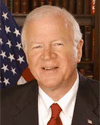
Saxby Chambliss (R) |

(D) |
Sen. Saxby Chambliss (R-GA) ran an extraordinarily mean-spirited campaign in 2002, accusing decorated Vietnam veteran and triple amputee Max Cleland of lacking patriotism. Chambliss also paired pictures of Cleland with Osama bin Laden and Saddam Hussein. Chambliss won by 7% and his net approval rating has stayed at that level. Still, Georgia is a conservative state and unless the Democrats find a stellar candidate, Chambliss is likely to win a second term. |
Idaho
| Incumbent | Challenger | Notes |

(R) |

Larry LaRocco (D) |
Sen. Larry Craig (R-ID) was a shoo-in for reelection until Aug. 28, 2007. On that date, Roll Call, a newspaper that reports on Congress, revealed that Craig had been arrested for lewd and indecent activities in the mens' room at the Minneapolis airport in June, pleaded guilty, and paid a $500 fine. While Craig is not in the same league as former Rep. Mark Foley (R-FL) (kids) or Sen. David Vitter (R-LA) (prostitutes), he was forced to announce his retirements. Senate Republicans are trying to force him out early so that the Republican governor can name a replacement who will have time to acquire some experience and visibility. If Craig hangs in there, it will be an open seat, albeit in a strongly Republican state. |
Kansas
| Incumbent | Challenger | Notes |

Pat Roberts (R) |

(D) |
Sen. Pat Roberts (R-KS) is a staunch conservative in a highly conservative state. He ran unopposed in 2002, winning a second term then. Maybe the Democrats will find a sacrificial lamb this time, maybe they won't. It doesn't matter. Pat Roberts will coast to a third term. |
Kentucky
| Incumbent | Challenger | Notes |

Mitch McConnell (R) |

(D) |
Although Democrats picked up a House seat in Kentucky in 2006, the state remains fairly conservative. Sen. Mitch McConnell (R-KY) matches the state well and as minority leader in the 110th Senate will wield considerable influence. He is unlikely to face much of a challenge for his fifth term. McConnell trivia: his first name is Addison but he goes by "Mitch" (his middle name is Mitchell). Despite the separation of powers mandated by the constitution, McConnell is intimately intertwined with the executive branch: he is married to Secretary of Labor Elaine Chao, the only member of the original Bush cabinet still in office. |
Maine
| Incumbent | Challenger | Notes |

Susan Collins (R) |

Tom Allen (D) |
Sen. Susan Collins (R-ME) represents a dying breed: moderate Republicans from the Northeast. New England used to be run by them, but they have suffered major losses in recent years. Collins is personally popular, but so was Sen. Lincoln Chafee (R-RI), and it didn't save him. Also working against Collins is her 1996 pledge to serve only two terms, something she repeated in 2002. She recently decided to break that promise and run for a third term. Her opponent, Rep. Tom Allen from ME-01 (who already represents half the state in the House), will undoubtedly harp on the broken promise. This seat will be very competitive. |
Minnesota
| Incumbent | Challenger | Notes |

Norm Coleman (R) |

(D) |
Sen. Norm Coleman (R-MN) will be the Democrats number two target in the Senate in 2008. He won his seat in 2002 by a tiny margin after his Democratic opponent, Paul Wellstone, was killed in a plane crash two weeks before the election. The Democrats hastily got former Vice President Walter Mondale to take Wellstone's slot on the ticket, but Mondale was unable to do what Frank Lautenberg pulled off in New Jersey--suddenly jump in and win. Both parties are keenly aware that in Nov. 2006, Hennepin County Attorney Amy Klobuchar (D) crushed Rep. Mark Kennedy (R) by over 20% for an open Senate seat. |
Mississipi
| Incumbent | Challenger | Notes |

Thad Cochran (R) |

(D) |
Despite being the first Republican to win statewide office since Reconstruction, Sen. Thad Cochran (R-MS) is a low-profile senator, far less widely known than his Mississippi colleague Sen. Trent Lott (R-MS). In 2005 he was appointed chairman of the powerful Senate Appropriations Committee, which handles spending bills. Think of the chairman as Mr. Pork. T Unfortunately for Cochran, with the change of power, Sen. Robert Byrd (D-WV) is the new chairman, greatly diminishing Cochran's power (new military bases go to West Viginia instead of Mississippi). Still, even without the pork he will be reelected by a landslide. |
Mississipi
| Challenger | Challenger | Notes |

(R) |

(D) |
Sen. Trent Lott's surprise resignation has opened up the other Mississippi Senate seat in 2008. Gov. Haley Barbour (R) will soon name Lott's replacement, and that person will have to stand for relection to the remainder of Lott's term in 2008. Speculation is that Rep. Chip Pickering (R) is a likely choice. While Mississippi is heavily Republican, it is not a lost cause for the Democrats. The Congressional delegation is split 50-50 and the Democrats control both houses of the state legislature. If former governor Ronnie Musgrove (D) runs, he might be able to put up a good fight. |
Nebraska
| Challenger | Challenger | Notes |

Mike Johanns (R) |

(D) |
Sen. Chuck Hagel (R-NE) is retiring after his second term. He is visibly disgusted with the Bush administration and says so in public. Former governor and secretary of agriculture Mike Johanns (R) is expected to be the Republican candidate and will probably win in a landslide. |
New Hampshire
| Incumbent | Challenger | Notes |

John Sununu (R) |

Jeanne Shaheen (D) |
Sen. John Sununu (R-NH) had not really been on the radar until Nov. 7, 2006, when a political tsunami hit New Hampshire. Gov. John Lynch (D) was reelected with the largest margin in state gubernatorial history at the same time two unknown Democrats knocked off the state's two Republican House members. The Democrats also swept to power in both houses of the state legislature for the first time since 1874. In this environment, the rematch between three-time governor Jeanne Shaheen (D) and Sununu is likely to be very different than Sununu's 2002 4% victory over Shaheen. Early polling gives Shaheen a 15-20% lead. Sununu has the additional burder of being a strong supporter of the war in Iraq, a highly unpopular position in New Hampshire. At this point, the seat leans Democratic. Sununu trivia: Sununu is the youngest member of the Senate and his father was governor of New Hampshire and Bush 41's chief of staff. |
New Mexico
| Challenger | Challenger | Notes |

(R) |

Tom Udall (D) |
New Mexico is truly a swing state. In presidential races, it is split right down the middle. It also has one Democratic senator (Jeff Bingaman) who wins in landslides and one Republican senator (Pete Domenici) who wins in landslides. Under normal conditions, Domenici would be a shoo-in for a seventh term, but in Oct. he announced his retirement due to brain disease. Two Republican members of the House, Heather Wilson and Steve Pearce, want the nomination, so there will be a bruising primary. On the Democratic side, Rep. Tom Udall (cousin of Mark in Colorado) is the likely candidate. This means that all three of New Mexico's congressional seats will be open. However, only NM-01 (Wilson's seat) is in a swing district. Pearce's district is R+6 and Udall's is D+6. Also, if Bill Richardson's presidential campaign crashes and burns, he has until Feb. 12, 2008 to file for the Senate. |
North Carolina
| Incumbent | Challenger | Notes |

Elizabeth Dole (R) |

(D) |
Sen. Liddy Dole (R-NC) did a spectacularly bad job as head of the NRSC recruiting strong senatorial candidates to challenge weak Democratic senators, such as the Nelson boys. Will the people of North Carolina blame her for losing the Senate? Probably not since most people (except politicians and political junkies) have never even heard of the NRSC. She won by 9% in 2002 and has a +20% net approval rating, so if she decides to stay she has a decent shot at it unless the Democrats can recruit a strong challenger. Two relatively unknown Democrats, state senator Kay Hagan, and wealthy businessman Jim Neal, have announced they are running. Dole trivia: Her husband was a long-time senator from Kansas and the losing Republican presidential candidate in 1996. Then he switched from elections to erections and became the national spokesman for Viagra. |
Oklahoma
| Incumbent | Challenger | Notes |

James Inhofe (R) |

Andrew Rice (D) |
Sen. James Inhofe (R-OK) is a staunch conservative who opposes abortion, gay marriage, and measures to combat global warming. As senator he doesn't have much influence on the first two, but as outgoing chairman of the Committee on the Environment and Public Works, he had a lot of influence on the latter. He is surely dismayed watching the new chairwoman, Barbara Boxer (D-CA), one of the most liberal members of the Senate, try to undo everything he did as fast as she possibly can. If he runs for reelection, he will likely win, but he would be 80 at the end of the term and might decide to retire. Currently Inhofe's only challenger is a 34-year-old state senator, Andrew Rice. |
Oregon
| Incumbent | Challenger | Notes |

Gordon Smith (R) |

Jeff Merkley (D) |
Sen. Gordon Smith (R-OR) is a moderate senator in a state that is trending Democratic. Although he won by 16% in 2002, his net approval rating is only 11%. While he has a fair shot at being reelected, his likely opponent, state House speaker, Jeff Merkley (D), could run the same campaign against him that Sen. Sheldon Whitehouse (D-RI) ran against former senator Lincoln Chafee (R) in Rhode Island: "Smith is a nice guy but do you want Mitch McConnell to be majority leader?" Merkley has an unknown primary opponent who will be defeated easily if he does not drop out first. This seat is definitely a Democratic priority. |
South Carolina
| Incumbent | Challenger | Notes |

Lindsey Graham (R) |

(D) |
South Carolina is a very Republican state, so Sen. Lindsey Graham (R-SC) is not in much danger. He is highly visible and should be reelected easily. Graham trivia: Graham has never been married. |
Tennessee
| Incumbent | Challenger | Notes |

Lamar Alexander (R) |

(D) |
Sen. Lamar Alexander (R-TN) is a moderate who survived a bitter primary in 2002, but won the general election by 10%. However, his net approval rating is now down to +3%, so he might be vulnerable, especially if Harold Ford, Jr., who came close to winning Bill Frist's seat in 2006, runs again. However, at this point, the odds favor Alexander. |
Texas
| Incumbent | Challenger | Notes |
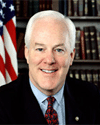
John Cornyn (R) |

(D) |
Sen. John Cornyn (R-TX) is a staunch conservative and close ally of President Bush. As a consequence, as Bush's popularity drops, so does Cornyn's. Most recently his net approval rating dipped to -3%, a warning sign for any incumbent. Many people wondered why lawyer Barbara Radnofsky bothered to run for the Senate in 2006 against the immensely popular Kay Bailey Hutchison, but the answer may be that the 2006 campaign was simply a warmup for the real race, in 2008 against the far less popular Cornyn. However, Nick Lampson (TX-22) faces an uphill race in Tom Delay's district. He's going to have to raise millions for a single House district. He might just decide to bet the farm and run against Cornyn instead. |
Virginia
| Challenger | Challenger | Notes |

Jim Gilmore (R) |

Mark Warner (D) |
Sen. John Warner (R-VA) has decided to retire after his term is over in Jan. 2009. Former governor Mark Warner (D) is the Democratic nominee. Warner is young, attractive, and made about $200 million as a cell phone entrepreneur, so he can finance the campaign himself. The only announced Republican so far is former governor Jim Gilmore. troublesome for the GOP is that the Northern Virginia suburbs, which are heavily Democratic, are growing rapidly and led to the election of Jim Webb (D) as senator in 2006 and Tim Kaine (D) as governor in 2005. Warner's retirement has suddenly made Virginia a likely Democratic pickup in the Senate. Even though the last Democratic presidential candidate to carry Virginia was Lyndon Johnson, due to the changing demographics, in 2008 it will be a huge battleground. |
Wyoming
| Incumbent | Challenger | Notes |
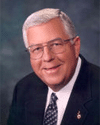
Michael Enzi (R) |

(D) |
Sen. Michael Enzi (R-WY) is a staunch conservative. Even though he represents a state with much natural beauty, he has consistently received a 0% rating from the League of Conservation Voters. Nevertheless, he won relection in 2002 by a 46% margin and should win easily in 2008. |
Wyoming
| Incumbent | Challenger | Notes |

John Barrasso (R) |

(D) |
Sen. Craig Thomas (R-WY) died of leukemia on June 4, 2007. Gov. Dave Freudenthal (D) choose state senator John Barrasso (R) as his replacement from a list of three candidates presented to hm by the Wyoming Republican party, as prescribed by Wyoming law. Barrasso has to stand for election in 2008 in order to fill out the rest of Thomas' term, which runs until Jan. 2013. If the Democrats could find a good candidate, they would run him against newbie Barrasso rather than against Enzi, but the only top-drawer Democrat in the state is Gov. Dave Freudenthal who has said he loves being governor and won't run for the Senate. |
Back to the main page.